Search terms, names, placenames in GOOGLE and WIKIPEDIA.
This link has everything you need: FHW Chronos (Foundation of the Hellenic World).
Chronos means 'time'.
Studying the long-lasting history of a particular people, could be helpful for understanding the functions of historical procedures in general. The greeks are one of the few study-cases of unbroken consciousness through the ages.
But what is greekness? I would describe it as the co-existence of three elements:
to question everything - to adhere to nothing - to create something. Some of the three, characterise many peoples regardless of nationality. But most mediterranean inhabitants tend to develop all three characteristics simultaneously. Probably it has to do with the climate's and place's diverseness: it is harsh enough to toughen, but not too harsh to crush you. It is mild enough to invite hopeful experimenting, but not too mild to loosen your alertness.
So, please, let me share with you the fascinating story of how a small people tried, inquired, excelled, sometimes failed and finally survived through time.
PERIODS of GREEK HISTORY
PREHISTORY-ANCIENT-MIDDLE-NEW TIMES: Stone-Bronze-Geometrical-Archaic-Classical-Hellenistic-Roman Occupation-Byzantium-Ottoman occupation-the New Greek State-Greece today-the future
- FHW Chronos
- Notebook: phases of greek history till 1453 by noteaccess.com
- To have a broad look on the parallel events all over the world, keep referring to HyperHistory by the Swiss Andreas Nothiger.
- Greece CONCISE History Information
- www.ahistoryofgreece.com with nice photos by period by Matt Barrett
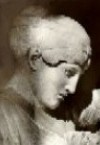

photographer: Nelly
(Nelly's 1899-1998)
mediterranean world
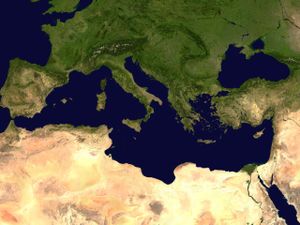
PREHISTORY in the area
- Palaeolithic maps Greece by FHW GREECE
- Stone Age (Palaeolithic, Mesolithic, Neolithic) in the helladic area by FHW GREECE
ANCIENT TIMES
from BRONZE AGE to CLASSICAL TIMES
When people say 'ancient Greece' they usually bring in mind the Golden century of Athens, Acropolis, Pericles, Olympics and the ideals of freedom and democracy. But these ideas were only one side of greek politics. Every civilization's contribution to human history is important. The rare thing about the ancient greeks is that they covered the whole spectrum of ideas on each particular issue: e.g. not only democracy, but everything from monarchy and aristocracy, tyranny (dictatorship), to democracy and anarchism. The pluralism of attitudes on politics, art, philosophy was almost complete. Humanity in its childhood wanted to try absolutely everything, with a great enthusiasm shared by all common people, an enthusiasm that appeared in such frenzy only once since then: in Renaissance.
The greeks stripped all ideas from covering shells, in the same way they stripped their statues from garments. Far away from inhibitions of gods and daemons, they chose a Promethean approach to life, brave, agonizing, but ultimately human.
PHASES
- PHASE 1
- Prehellenic MINOANS in Crete
- 4.000 - 3.000 a.e.v. the greek phyla arrive: Ionians, Aeolians, Dorians
- MYCENAEANS in Mycenae (MAP)
- 4.000 - 3.000 a.e.v. the greek phyla arrive: Ionians, Aeolians, Dorians
- Minoan Crete by FHW, GREECE
- Aegean Islands (CYCLADES etc.) in the Bronze Age by FWH GREECE
- Bronze Age in the Mainland Greece - Mycenae by FHW GREECE
ARCHAIC PERIOD
CLASSICAL PERIOD
GENERAL LINKS
- AncientGreece.com - history, mythology, art, culture, architecture, lots of links.
- Demos: Classical Athenian Democracy by Christopher Blackwell at USA
- The Greeks, documentary by PBS USA
- Art History Resources Ancient Greece by Chris Witcombe at Sweet Briar College USA
- GREEK ART by topic and period
- ANCIENT GREEK LITERATURE
- ANCIENT-GREEK MUSIC
ANCIENT SOURCES
- For the full texts you can check in PERSEUS PROJECT
- Ancient History Sourcebook Full Texts by Paul Halsall USA
- National Archaeological Museum, Acropolis Museum, AthensGREECE
- British Museum London GB
- Louvre Museum Paris FRANCE
- ...and all the archaeological sections of museums around the world: museums
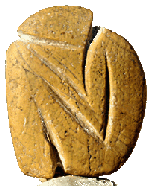
neolithic seated figure
c. 6500-4500 a.e.v.
Volos Museum
INFO
ENLARGE
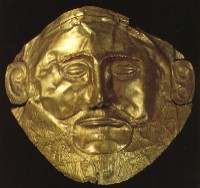
'Agamemnon' mask
Mycenae (MAP) 16th cent. a.e.v.
Athens National Museum
INFO
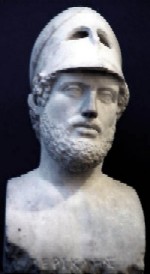
Pericles' bust
copy of roman times
British Museum
INFO
Greek Mythology
What is greek Mythology? It was a collection of myths that did not present a 'creator of the world' as its centre. It borrowed all kinds of deities from its indoeuropean past and its contemporary neighbours. It tried to push back the dark, monstrous figures and formed a pantheon of gods that resembled humans in every way. Hesiodus (HΣIOΔOΣ) was the poet that gave us a genealogy of greek gods. Homer's (OMHPOΣ) epic poems are full of the joys, jealousies and caprices of gods and heroes. But religion has never dominated over the thought of greek philosophers of the time. Its anthropocentrism made the domination of priesthood over the Greeks impossible.
- Greek Mythology Link, by Parada
- Encyclopedia Mythica Greek mythology
- www in2greece.com: history, mythology, greece
detail from west metope
of Zeus temple at Olympia (MAP)
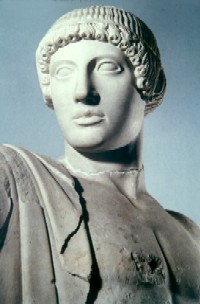
ALEXANDER and HELLENISTIC TIMES
Alexandros, son of Philippos, from Macedonia (AΛEΞANΔPOΣ ΦIΛIΠΠOY MAKEΔΩN) is no doubt one of these few people who inflicted a tremendous impact on their times, rather than their times on them. Although I am not fond of expansionism, I could not help being very curious about this man. How did he manage not to be remembered only as a military bulldozer after conquering so much of the world of his time? Because he was formed by his teacher Aristotle? Perhaps because of his witty mottos we still quote today. We find his controversial outbursts of friendship and hate, of good and of evil, charming? Perhaps because we are too romantic. Is it because he built so many Alexandrias (although Persepolis -Takht-e-Jamshid- was destroyed)? What did his conquered nations really think of him? What is Al-Iskander to them? Today, the legend of 'megalexandros' lives in greek folklore as vivid as ever.
He died in his 33rd year and his conquered territories were divided among his companions. In the following years greek language, art and science flourished all over these regions. This era is called hellenistic. Perhaps because of the quasi-hellenic mentality of so many different peoples.
During this interregnum a new power is preparing to take over: The Romans.
ALEXANDROS LINKS
- Alexander and Hellenistic Period by FHW GREECE
- In the footsteps of Alexander the Great with Michael Wood: a BBC documentary @wikipedia
- The ten-horned beast: Alexander the Great from a Persian point of view
- Alexander the great, Project by John J. Popovic
- Alexander the Great joint personal project
- ΠΛOYTAPXOΣ (Plutarch) Alexander In MIT archives USA. Full Text translated in english.
- APPIANOΣ (Arrianus)
PLACES
- Vergina (ancient Aegae) (the tomb of Philippos, Alex's father is there)
- Persepolis (a city destroyed)
- Alexandrias (cities born).
findings at Vergina

probably Alexander and Philippos
ivory heads, Vergina
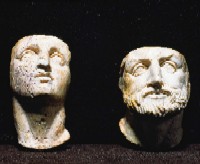
The GREEKS UNDER ROMAN OCCUPATION - Romaeocracy
Greece was looted (all roman villas owned greek statues) and taxed (with some exceptions). Greek slaves were brought to Rome, where they mostly taught and worked in wealthy households as servi literatti. Lots of romans fell in love with their greek province, came to Athens to study, and built theatres, baths and roads all over Greece (such as the famous 'Egnatia'). The roman occupation was so long, and the transition to the eastern roman empire so gradual, that we still call ourselves 'romios' today.
- 146 a.e.v. to 333 e.v. Greece under Romans by FHW GREECE
- ΠΛOYTAPXOΣ (Plutarch) BIOI ΠAPAΛΛHΛOI (Lives Parallel: biographies in pairs: one greek - one roman personality of the ancient times).
- Art History Resources Ancient Greece and Rome by Chris Witcombe at Sweet Briar College USA
- Monuments and sites in ATHENS see Roman.
- Via Egnatia (of Egnatius) by wikipedia
Odeon built by Herodes Atticus
Athens

BYZANTIUM 330 e.v. - 1453 (middle times)
From the collapse of the Roman Empire, its Eastern part immerged as a new empire: it survived, flourished but it gradually became totally different from the Roman:
a) It was the first christian state. It retained and cultivated Roman law system, but its christianocentrism added new characteristics. Byzantine imperial, religious and military representatives were distinct. (although they 'interacted' on each other).
b) Although it was a multiethnic empire, it was gradually hellenized. (turning point: 6th cent.) When all the new peoples at Europe used the latin language (or latina vulgaris), the inhabitants of Byzantium used again the common greek of the time.
The heritage of ancient Greece was perhaps overwhelmingly heavy on the shoulders of the byzantines. Their literature and art, philosophy and political thinking never came close to the ancient output: it was devoted to, and, dominated by the young christian religion, which loathed and envied in the same time the ancient achievements. The study of ancient greek texts was cultivated at the time by the Arabs. Only during the period of maturity (oddly this was its decline era, 1204-1453) did byzantium show signs of change and flourishing in art and philosophy. In 1204 Constantinople fell to the hands of Crusaders and in 1453 to the Ottomans becoming the capital of the Ottoman empire.
The word Byzantium was used by the german H. Wolf in 1562 instead of Eastern Roman Empire or Romania which was the term used by the byzantines. Modern historians took up the term for referring to this historical era. We still call ourselves romios today and our language romaeika. Most of our everyday customs, proverbs, habits have their roots in this period, as well as the following Ottoman occupation period.
The byzantine era is generally unknown to the average western european.
PRESENTING THE HISTORY
- Early Byzantine Period 330-610 by FHW GREECE
- Middle Byzantine Period 610-1204 by FHW GREECE
- Last Byzantine Period 1204-1453 by FHW GREECE
- Metropolitan Museum USA #byzantium
- byzantine topics by wikipedia
- byzantine places: maps
- Overview of Byzantium and byzantine studies by Paul Halsall
- Frangokratia = Latin occupation of Greece by FHW, GREECE
- Frankokratia in Mani - history of the Frankish Period 1204 - 1460 at www.maniguide.info by John Chapman.
- Mediaeval City of RHODES
- www.in2greece.com: Venetian and Ottoman rule
- ART see byzatine sections by TOPIC and PERIOD.
- BYZANTINE LITERATURE hymnographers and authors.
- BYZANTINE MUSIC
- ΠPOKOΠIOΣ (Procopius), KAΣΣIANH, MIXAHΛ ΨEΛΛOΣ (Michael Psellos), ANNA KOMNHNH (Anna Comnena)
- SOURCES WRITTEN BY FOREIGNERS, AS: Geoffrey de Villehardouin, CHINESE WRITERS, IBN KHALDUN
- Roman and Byzantine Emperors
- Roman and Byzantine Emperors Dates at Byzantine Studies Page
- Patriarchs of Constantinople Dates at Byzantine Studies Page
- Byzantinism and Arabism 5th century: article by Irfan Shahid
PLACES of BYZANTINE INTEREST
Iustinianus I emperor 527-565
detail from mosaic (c.547)
in San Vitale basilica, Ravenna, Italy

and his wife, Theodora
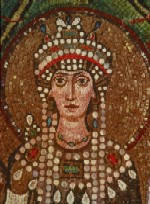
detail from Anastasis (resurrection) mosaic (~1315-21)
Chora church (or Kariye), Istanbul
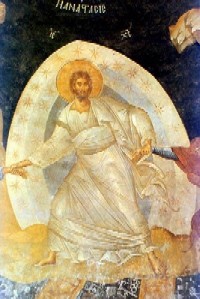
NEW TIMES 1453 - today
The greeks lived under the Ottoman occupation of the Balkans for centuries (1453-1821). (also, some Venetian and Frankish occupation). During these times, all european nations of the Ottoman empire (which was religiously tolerant, but utterly different from them) fought, revolted, some times collaborated with the occupying power, assimilated in some cases (a few groups were islamized), lived side by side and interacted on each other. In the meantime, Europe was experiencing its triumphant Renaissance. The greek diaspora, communities of merchants and scholars in Italy, Austria, Russia, France, were the links of the greeks to the outside world.
The European Enlightenment, the American and French Revolutions, the formation of nation-states were ideas that finally have made their way into the greek population's psyche by the turn of the century. The revolution (1821) released the surfacing of a tremendous number of gifted persons. Peasants that excelled in military and political life, merchants, scholars, the great number of european philhellenes, made the acceptance of a new greek state tolerable to the european powers.
The new greek state starts its life in a chaos of political and social turmoil. The axis of its life: foreign powers, alien monarchs, internal rivalries and civil wars, the agonizing strife of many portions of the population for genuine independence, the Balkan and World Wars.
Today, Greece is finally reaching an equilibrium, maturing towards the future with its triple european-balkan-mediterranean character.
NEW TIMES: 1453-today a) MODERN b) CONTEMPORARY
MODERN TIMES: 1453-1821
BY PERIOD or SUBJECT
FRANCOCRACY and ENETOCRACY continued from previous period.
- Regas Velestinlis (Feraeos)
- Regas Feraeos Velestinlis was a revolutionary mind that envisioned a united balkans including the Turks, wrote its Constitution, poems etc. He was one of the purest revolutionary souls in Europe. Was finally exterminated. You can see him at the 10cent greekversionEURO coin.
- Regas
- THE PHILHELLENES
- ...were not greek by birth, but by choice. Citizens of foreign countries, they fell in love with greek ideals (mainly ancient) or revolutionary ideals in general. The societies of Paris, London etc. were donating large amounts of money for the greek populations. A great number of philhellenes fought and died on greek soil. Today, they are referred to, as greeks par excellence. The long line of foreigners that fought for democratic causes on greek soil, spans till the last dictatorship of 1967-74.
- CONTEMPORARY TIMES: 1821 - today
- 1821 the revolutions starts, the greek stated is official in 1832.
- Greece in modern times by the Foundation of Hellenic World GREECE: history, art, politics
- 1821 the revolutions starts, the greek stated is official in 1832.
- 1821-1897 Liberation and the New Greek State.
- 1897-1922 Expansion, Balkan wars and World war I. Farewell Anatolia: the exchange of populations with Turkey (1924-6).
- 1923-1940 The mid-War era.
- 1940-1945 World War II, German occupation, the People's Resistance and Free Greece at the Mountain areas.
- 1945-2000 Last civil war, Last dictatorship and the decades till today (2000).
- A Short History of the Jews of Greece Nikos Stavrolakis
- Hellenic Resources For treaties, conventions etc.
-
- POLITICS TODAY (2004 e.v.)
- Parliament of GREECE Parties, Elections, Results DATABASE
- Conservative and progressive forces have been rivalling each other in Greece since ancient times. The greeks are deeply involved in politics at all times. We had three major civil wars in the last 150 years with immense human loss.
- Parties need 3% at least to get in Parliament. But of course there are many smaller parties functioning.
- Main two parties: New Democracy and PASOK. The spectrum from right to left could be described as follows: Tiny ultra-right parties do exist but never had a real impact on society. Greece never had a fascist movement. Right wing is represented by New Democracy. Centre used to be represented by a large party but now is spread to right, left or small parties. Left has a long history and a long list of sub-parties, from mild-socialist, euro-communist, to communist and tiny other left variations. Mainly: Panhellenic Socialist Movement (PASOK) (which is also voted by non-left, centrish voters), the Communist Party of Greece (KKE) (strict communist-line). Communists that left the KKE formed SYNASPISMOS (euro-oriented).
- Ecological concern penetrates all parties' programmes. At the moment there are ecological non-political organizations rather than one ecological party that attracts voters.
- Key-figures: politicians from 1821 to today, chronologically:
Kapodistrias-Trikoupis-Venizelos-Karamanlis-Papandreou - POLITICS TODAY (2004 e.v.)
Venizelos, Eleftherios (or just: Lefteris. Not to be confused with other politicians with the same surname).
Trikoupis, Harilaos (1832-1896)
Karamanlis, Konstantinos (not to be confused with other members of his family -also politicians-)
Papandreou, Andreas (or just: Andreas). Not to be confused with his father or his son -also politicians-)
GREECE TODAY
- INTRODUCTION to Greece and links
- GREEK CULTURE PAGE.
- Grèce @amb-grece.fr lang:fre.
- The Prime Minister's Office
- Parliament of GREECE
- POLYTECHNIO SCHOOL of ATHENS Metsovio (NTUA)
Traditionally the cradle of the élite of science. Its revolt against the junta in 1973 has landmarked greek history (see PHOTO). So, not only scientists, but politicians and ministers came out of its classes! - Aristotelian University of Thessaloniki: site in gr, eng, sp, fr, it, ger and russian
The University of Thessaloniki (Salonica) has traditionally been the home of progressive professors of humanistic and other faculties. - University of Crete
The greek university participating in the international human-DNA research. One of the most progressive ones, nice publications too. University of Crete Press / Publications - University of Patra
- University of Ioannina
- Democritos University of Thrace
- University of Athens
oh well... here is my school. Its site is under construction since i have known it. Some pages ARE added, I admit it. - List of greek Academic Institutions by HRI
- National Documentation Centre under construction - EΘNIKO KENTPO TEKMHPIΩΣHΣ
- National Statistical Service of Greece the 'ELSTAT'
- Greek Research Technology Network
- National Hellenic Research Foundation - Εθνικό Ίδρυμα Ερευνών
- Médecins du Monde ΓIATPOI TOY KOΣMOY
- Médecins Sans Frontières: ΓIATPOI ΧΩPIΣ ΣYNOPA
- SAE World Council of Hellenes Abroad @wikipedia
- School of Modern Greek, by U. of Thessaloniki, for foreigners that wish to study in Greece
P.S. EYPΩΠH: Europe, our Europe
She was a young Phoenician princess, Zeus fell in love with. He abducted her, brought her to Crete and she gave her name to a continent where so much has happened!
European Union? and what is that? Of course, every inhabitant of Europe has a different concept of what Europe is. So, what is the interlinking basis of so many peoples? The common future, and some common experiences of the past. In my mind, they are:
- 1• a greek-concept based education.
- 2• the roman empire impact (directly or indirectly).
- 3• the christianization of the european peoples, and islamization of the eastern and south Mediterranean.
- 4• the western renaissance and enlightenment influence, as opposed to religion-centrism.
- 2• the roman empire impact (directly or indirectly).
And what is this future like?
!... this is the next chapter, to be written by someone else, when these webpages will be lost in cyberspace, mere ancient personal documents of the people that lived in 2000! So, you, reader of future times, please write the next chapters! I hope they are the best, in this story. Good luck!
- Europa the phoenician princess @wikipedia
- Europa - The European Union On-Line
- the Euro @europe.eu Check the 2EUR coin of Greece: Europe on the back of the bull (Zeus).
- European Parliament EUR
- Council or Europe EUR
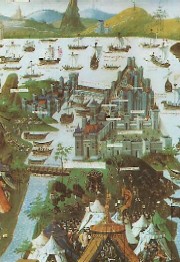
Regas
He who thinks free, thinks well.
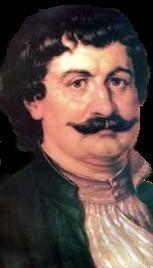
The Sortie (exodus) of Messolongi
painter: Theodoros Vryzakis
Athens National Gallery
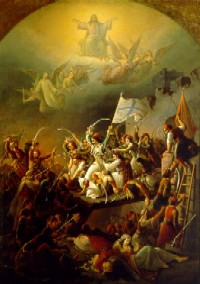
Greek parliament 19th century
Detail of painting by N.Orlof
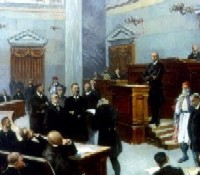
image@wikipedia
photograph of
Eleftherios Venizelos (1864-1936)
politician
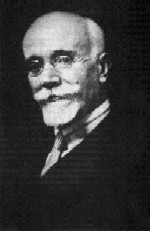
World War II
the Parthenon
during nazi occupation
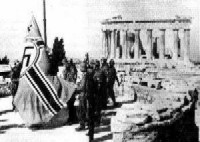
World War II
freedom figthers of E.L.A.S.
women partizans
on the greek mountains

Polytechnic School of Athens
uprising of 1973
against the junta
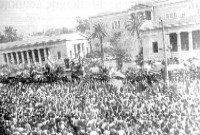
dramatic night of
17th November 1973
the tank enters the Polytechneio

greek parliament in session
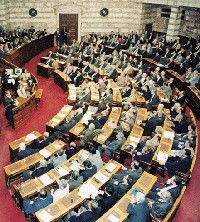
links checked NOV 2007.